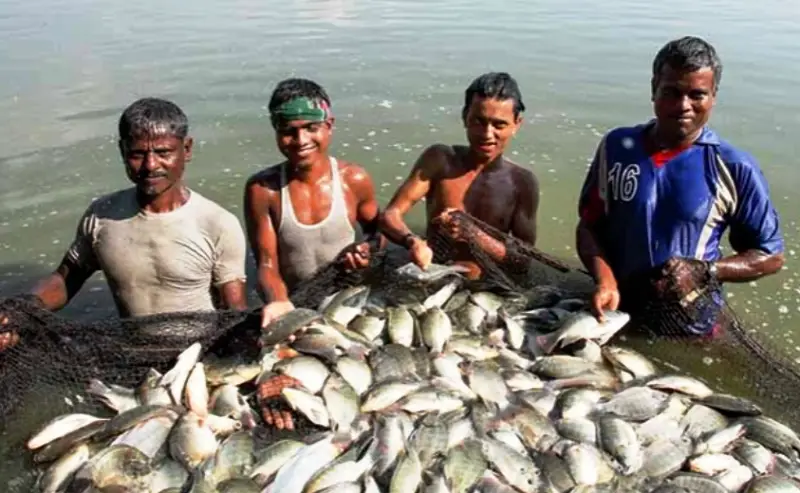
Guide to 6 Lucrative Fishing Industry Jobs: Salaries, Duties & More! The fishing industry includes businesses, companies and operations that focus on fishing and processing fish products. This can include fishing boats, those who prepare and process products and businesses that create tools for fishing. If you’re interested in joining the fish industry, learning more about the different careers you can pursue can be beneficial.
In this article, we review six jobs in the fishing industry, explore important skills for these professionals and provide helpful tips for joining the fishing industry.
6 jobs in the fishing industry
If you want to join the fishing industry, it can be helpful to learn more about what different professionals do and how much they make. Here are six jobs in the fishing industry for you to consider. For the most up-to-date Indeed salaries, please click on the links below:
1. Fish hatchery technician
National average salary: $45,557 per year
Primary duties: Fish hatchery technicians work with fish farming operations to care for the fish they grow. The technician may collect reproductive materials from adult fish to encourage breeding and fertilize eggs. Technicians focus on improving fish culture and monitoring fish distribution. They may also clean the grounds and clear debris from the pools where the fish live.
2. Fish cutter
National average salary: $46,519 per year
Primary duties: Fish cutters clean and prepare the fish after other professionals catch or grow them. The cutters examine the fish for signs of disease or illness before shucking shellfish, trimming the fish and processing them. The primary focus of a fish cutter is to process the fish and seafood products so restaurants can prepare them and grocery chains can offer them to their customers.
3. Sailor
National average salary: $49,045 per year
Primary duties: A sailor is a deckhand or nautical professional who assists the captain by maintaining the vessel and assisting with steering functions. If a boat has sails, the sailor may adjust them and work with others to ensure the boat continues on the proper path. Boats without sails also have sailors who maintain the vessel by repairing units, replacing parts and monitoring the engine and motor.
4. Boat captain
National average salary: $52,499 per year
Primary duties: A boat captain is the leader of the boat. They provide guidance and direction to sailors and deckhands and often determine the route the vessel takes. In the fishing industry, they may determine when to pause the operation for weather or find new territory for finding fish. The boat captain often has substantial experience as a sailor, boat crewman or fishing professional.
5. Fisherman
National average salary: $78,455 per year
Primary duties: Fishermen are the professionals on a boat or in a fishing operation who understand different types of fish and their movements. Many fishermen work with commercial organizations to find and catch fish and sell them, but some fishermen catch fish on their own or with a small team. Skilled fishermen have advanced knowledge of how fish migrate, the best types of equipment and lures to use and when fishing seasons occur.
6. Fisheries manager
National average salary: $79,624 per year
Primary duties: A fishery is a location where professionals raise fish to harvest and sell. Fishery managers are leadership professionals who screen areas to determine which are best for fishing, assess fish growth, determine the best ways to keep fish healthy and provide guidance and direction to other fishing professionals. The fishery manager maintains budgets, monitors expenses and manages the process of hiring new talent to work with the team.
Important skills for fishing jobs
By improving your fishing industry skills, you may enhance your performance and potentially increase your earnings. Though some fishing professionals need more advanced skills than others, many share the same basic abilities. These are some important skills for those in the fishing industry:
Communication
Fishing professionals often work in teams to raise or catch fish, and this makes communication an essential skill. Communication is the ability to understand and articulate information when conversing with someone else.
Having excellent communication allows you to improve your collaboration and teamwork with other fishing professionals. When on the boat, fishing professionals may use nonverbal cues, like hand signals and other forms of communication to promote safety and convey information.
Physical fitness
Many professionals who work on boats need great physical fitness. This helps them keep their balance while the boat is moving and lift and transport heavy objects and tools on the boat.
Fishing professionals often stand, walk and perform manual labor throughout their shifts, so being physically fit is important. If the fishing professional comes in contact with the water, being fit enough to swim until help arrives is also critical.
Safety
There are many safety regulations on boats and for those who work in fisheries. This includes information about how to react to storms and inclement weather. Fishing professionals also understand how to operate emergency tools, like life jackets and life rafts.
Understanding safety functions and compliance includes monitoring these tools to ensure they’re functional and present in case of an emergency. Attention to detail and discipline are important safety skills for fishing professionals.
Persistence
Those who work in the fishing industry may experience unpleasant circumstances. This can include wet environments, rain and strenuous tasks. Persistence is the ability to continue working when the situation isn’t ideal, and it’s an essential skill for fishing professionals. Having great persistence helps them complete their shifts and earn promotions on the fishing vessel.
Tips for getting into the fishing industry
If you’re interested in finding a position in the fishing industry, there are some steps you can take to improve your chances. These are some tips you can use to get into the fishing industry:
Learn more about fishing policy and regulations. Thoroughly understanding the fishing policies and regulations in your state or region can help you better understand the licensure or certification you may need for working in certain environments. Studying these policies can help you improve compliance and advance your career.
Consider pursuing additional certifications. Depending on where you live and the fishing regulations, you may need additional fishing or boating certifications. Consider pursuing them before applying for positions in the fishing industry to improve your application materials and value to the employer.
Refine your resume and cover letter before applying. Ask a friend or family member to read through your resume and cover letter before submitting them to your potential employer. You can use online programs to check for proper grammar and spelling.
Create a career plan in the fishing industry to follow. Creating a career path can help you take important steps for advancement. For example, if you want to become a fishing boat captain, outline the positions and credentials you can pursue on your way to that title.










